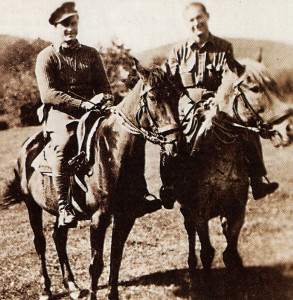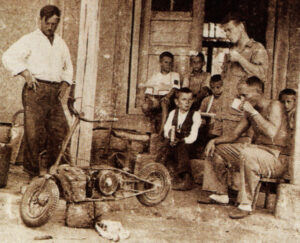
From a deep sleep, I was instantly awake, instantly alert. The barn door had been opened and a large man with a bearded face was looking down on us. One word was all he spoke and, even without the urgency his whole attitude conveyed, that word, the three of us knew, meant: “Get out of here -and fast”.
We pulled on our boots. As soon as we were on our feet, our actions were those of automata. Having a special affinity with the horses, I ran to the stable and loaded the packframes onto the two animals. Soon, with all our equipment loaded, we were ready to go,
Along the narrow dirt road streamed armed men – and a few women – with here and there a primitive cart pulled by bullocks. A group of men, formidable but with cheerful grins, slowed to allow our little group to join the column. Our forced march had begun, and we had no idea of its duration or of what the days would bring.
We were at the start of a Pokrit
– a fighting, strategic withdrawal
– one of many in which we had been involved. Judging by the others, we knew we were not exactly on a picnic. The year was 1944, the location north west Yugoslavia, the situation rather dicey. But we were in good hands. Our travelling companions were a group of Tito’s Partisans – men in whom we had complete trust.
A little distance behind came the cause of the Pokrit – well-armed German troops. The Partisans had quickly learned
the futility of doing battle with a force far superior in numbers and weapons, and were engaged in their well-tried and highly successful manoeuvre of am-bush and retreat.
At the rear of the column, three or four Partisans, well concealed, would fire rapidly at the enemy before silently withdrawing. A few hundred yards further along others would do the same. These tactics continued during daylight hours, inflicting losses on the Germans and slowing down their pursuit.

We three Englishmen – members of the Special Operations Executive (SOE) – had been parachuted into Yugoslavia with orders to attempt to set up resistance groups in German-occupied Hungary. Between our efforts to cross the border into that country, we worked and fought with the Partisans.
Our forced march would continue until we reached the mountains, where the Yugoslavs came into their own. Although the Germans would sometimes follow and attack in daylight, they had learned from bitter experience that their superiority in men and arms counted for little against the stratagems of the mountain-bred Partisans. And they never dared make camp in the mountains at night.
As the hours passed – more than five had gone by when first I looked at my watch -1 realised I was hungry and felt very thankful for the small piece of sustaining iron-ration chocolate I was able to munch as I marched.
When the pursuing Germans were especially near, everything else went out of my mind, but as the danger lessened, the ache in my feet seemed almost unbearable. It was when this happened that my admiration for the Partisans, always very deep, became even stronger. Quite a few of them had no boots.
Darkness eventually came, and with it orders to halt. Our first concern was the horses. Water was readily available – the Partisan leaders always made camp near a stream – and they each had their bag of oats. We ate from the first tins we found, which was American bacon; delicious when hot, but greasy and unappetising when eaten cold. Two hard tack biscuits and a drink of stream water completed our meal and we then snatched a few hours sleep on the springy turf.
When darkness fell on the second day, word came down the line that we were to have a short halt then move off again later.
“Later” came much sooner than I wanted it to, and we were quickly on our way – now, of course, in complete darkness, and with heightened tensions. This night marching was another very successful Partisan ploy. Our column had changed direction, and I worked out that we were now on the enemy’s flank. Then, as the night wore on, I reckoned we had travelled in a great arc and were well on our way to leaving the Germans behind.
At last we were heading for our base – a journey that would take at least two more days. But we were due to stop in a safe village en route where we would be able to make fires and have hot food.
We arrived just as the miller was letting out the cooling water from his engine into a large stone trough. This water was a dirty brown – but it was hot! Quickly I ripped off my filthy clothes and enjoyed my most luxurious bath ever.
I couldn ’t soak long as a queue soon formed, but I had been first and felt proud of my enterprise.
Before we settled down to sleep in a barn, I decided to listen to the news. “This is the BBC World Service”, came the usual announcement. Then “Here is the news for Saturday, August 31st, 1944”.
It was my twenty-first birthday!
Ah well, under the circumstances, my bath was the perfect present.
Elizabeth Purdy
(Based on the written records of Ernest Purdy)
■ The SOE was the brainchild of Winston Churchill and was formed in complete secrecy in 1940 and disbanded early in 1946. Churchill’s directive was that German-occupied Europe should be “set ablaze” and SOE teams formed new resistance groups and aided those already in existence.








